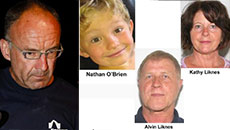TORONTO — An Ontario woman convicted in the brutal beating death of her three-year-old daughter was sentenced to 10 years in prison Friday, as the judge presiding over the case called her the child's "greatest enemy."
Nandini Jha, who was originally charged with second-degree murder in the death of her daughter Niyati, was found guilty of manslaughter after a seven-week jury trial earlier this year.
In delivering her sentence, Superior Court Justice Deena Baltman said the 38-year-old Jha was Niyati's sole protector but "instead of defending her, she beat her repeatedly, ultimately to death."
"This crime was a betrayal of the most sacred bond of trust and care that should exist between a parent and a child," Baltman said. "The very person to whom a child would look for refuge turned out to be her greatest enemy."
Crown lawyers alleged that Jha beat her daughter over many weeks, culminating in a final fatal attack.
Court heard that Niyati sustained a massive brain injury in September 2011. She was unconscious when her family took her to a walk-in clinic near her Mississauga, Ont., home and was declared brain dead in a Toronto hospital a day later.
"By the time Niyati arrived at the hospital her head had swollen to the size of a football and there was brain matter oozing out of her ear," Baltman said, noting that in addition to the fatal injuries Niyati suffered, her body was later found to be riddled with dozens of internal and external injuries, that included bruising, hemorrhaging and multiple fractures.

Just why Jha repeatedly abused her child, however, was hard to understand, Baltman said.
Jha was not a young inexperienced mother — she had a child before Niyati was born and two after — nor did Jha allege she was a victim of abuse herself, and there was no evidence at her trial of an addiction or a low intellectual ability, Baltman said.
The judge noted that Jha had immigrated to Canada from India with her husband "largely against her will." She had no family or friends, couldn't speak the language and felt burdened by the responsibility of raising the children virtually on her own while her husband worked long hours, Baltman said.
"But many immigrants overcome those obstacles for the sake of making a better life in Canada for their children," Baltman said. "It is deeply ironic that while the Jhas moved to Canada to improve their children's lives, that displacement might have brought Mrs. Jha to kill her daughter."
Jha had claimed that Niyati was very mischievous and got hurt constantly while playing, court heard. She had also said a bookcase fell on Niyati when she was trying to climb it about a month before her death, suggesting the two incidents were linked, court heard.
Baltman rejected Jha's bookcase defence, saying it was a "fiction she concocted to explain the bruises caused by her beating Niyati."
Baltman also found that Jha did not express remorse for her daughter's death and noted that the girl must have felt "terribly lonely and abandoned."

"Niyati was a young and helpless child," Baltman said. "Even now, not one family member appears to sincerely mourn her death ... it is left to this court to speak for her."
With credit for time already served, Jha now has nine years and two months left in her sentence, after which she could be deported to India as she is not a Canadian citizen.



